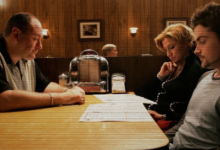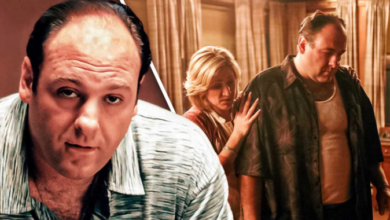This ‘Sopranos’ Deleted Scene Answers a Decades-Long Question
David Chase revealed an alternative ending that could have changed the legacy of one episode.
The Sopranos is so packed with classic episodes that choosing just one as the best is no easy task. Between the shockingly dark twist of “Long Term Parking,” the experimental surrealism of “The Test Dream,” and the controversial finale of “Made in America,” fans are often forced to debate which installment best represents the series. However, “Pine Barrens” is one of The Sopranos’ most hilarious and surprising episodes, as it’s one of the few that doesn’t singularly focus on Tony (James Gandolfini).
Essentially a comedy of errors, “Pine Barrens” follows Christopher Moltisanti (Michael Imperioli) and Paulie Gualtieri (Tony Sirico) as they attempt to make a collection from the Russian criminal Valery (Vitali Baganov). After Valery determines that the two mafia men are there to kill him, he escapes into the wilderness of New Jersey’s Pine Barrens, forcing Christopher and Paulie to chase after him. Although the ambiguous ending is one of the episode’s greatest charms, David Chase revealed an alternative ending that could have changed the legacy of “Pine Barrens.”
What Happens in “Pine Barrens”?
Although the episode does feature Tony’s anxiety about his unstable relationship with his girlfriend Gloria Trillo (Annabella Sciorra), “Pine Barrens” serves as a critical moment in the relationship between Christopher and Paulie. The two characters have frequently been at odds with each other as they vie for Tony’s favor. Paulie is a former soldier who doesn’t think that Christopher possesses the responsibility that would make him capable of leading Tony’s empire; comparatively, Christopher detests Paulie’s constant insults and feels that he is needlessly sowing rivalries within the family. The rivalry between them grows more hostile when Valery proves difficult to apprehend; as much as it pains them to admit it, Paulie and Christopher are forced to rely on each other.
The brilliance of “Pine Barrens” is that Valery’s fate is unimportant to the narrative arc of The Sopranos. It makes sense that Tony’s schemes would earn him a few enemies he never gets to confront, and the Russian characters don’t play a significant role in the rest of the series. However, “Pine Barrens” shows how incompetent both Christopher and Paulie are without Tony’s leadership, as they don’t sufficiently plan for the potential of Valery’s escape. Although both characters form a begrudging respect for each other by the time the episode concludes, their failure foreshadows their tragic fates. In the final season, Christopher dies as a result of his constant drug use, and Paulie remains alongside Tony until the bitter end.
“Pine Barrens” famously ends with Paulie and Christopher feeding a false story to Tony about Valery’s escape, as neither of them is brave enough to admit the truth. Valery’s fate is never revealed, and the ambiguous ending of “Pine Barrens” makes it a stronger episode. Christopher and Paulie are forced to live with the consequences of their lie for the rest of the series; presenting a scenario with no easy solution felt like a more realistic moment for the show. This refusal to conform to traditionally rewarding narrative structures makes The Sopranos one of the greatest drama shows of all time.
David Chase Filmed an Alternative Ending for “Pine Barrens”

While its open-ended conclusion sparked heavy debate among fans of The Sopranos, Sirico revealed that a more conclusive ending for “Pine Barrens” had been filmed. Instead of being rescued by Bobby Baccalieri (Steve Schirripa) after nearly freezing to death in the woods, Paulie and Christopher would have found Valery hiding outside a bar and shot him to death. A moment of such brutality wouldn’t have been unusual for The Sopranos, but Chase didn’t feel that it would have fit within the episode’s realistic tone. Chase “wanted the audience just to suffer” so they would feel the same sense of desperation that Christopher and Paulie did.
Despite filming an alternative ending, Chase revealed that Valery actually survived after the events of “Pine Barrens.” According to his headcanon, Valery was discovered by a group of Boy Scouts, who phoned his boss Slava Malevsky (Frank Ciornei), who in turn ensured his safe return to Russia to receive brain surgery. Valery’s survival may have become one of The Sopranos’ more shocking moments, but the information is inconsequential because the information is limited to what the identifiable characters know. The Sopranos succeeded because it put its antihero characters in vulnerable positions; despite their violent behavior, it’s hard not to become emotionally invested in both Paulie and Christopher after seeing what a challenging situation they endured.
“Pine Barrens” Is the Most Influential Episode of ‘The Sopranos’

While it’s generally regarded as one of the more humorous installments, “Pine Barrens” established the ambiguity that The Sopranos would use in its series finale. The episode confirmed to fans that everything would not be wrapped up, and that some of the show’s storylines would be left up to interpretation. The final episode, “Made in America,” became one of the most divisive television finales of all time because it didn’t confirm whether Tony and his family had survived. Some of the show’s harsher critics may have argued that the inconclusive ending was a gimmick, but the fact that “Made in America” continues to spark such debate is proof of its lasting influence.
“Pine Barrens” was also directed by Steve Buscemi, who would later become one of the show’s most important guest stars. Buscemi appears in the fifth season as Tony B., a former criminal who attempts to turn his life around upon his release. His eventual return to the mafia world fits within the tragic The Sopranos theme that the criminal lifestyle is inescapable.


